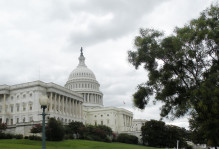Ambassadors, Arms and American Security
Following Account of Ambassador Courtney visit provided by Guest Blogger: Haley Bauser
Following Account of Hillary Waldron visit provided by Guest Blogger: Bryan Joyce
Following Account of CNAS visit provided by Guest Blogger: Darice Xue
May 15, 2013
On Wednesday, the day began at the William & Mary Washington Office, where I had the distinct honor of welcoming Ambassador Ronald Neumann: former ambassador to Afghanistan, Algeria and Bahrain – now President of the American Academy of Diplomacy. He was accompanied by Ambassador Courtney, former ambassador to Georgia and the first ambassador to Kazakhstan who worked primarily with Eastern Europe and nuclear non-proliferation efforts. He and Ambassador Neumann spoke in an informal manner, often piggy-backing on the others comments, providing a more interesting and relaxed take on the real-world experience of being a diplomat.
In discussing the misconceptions about the lives of diplomats, Ambassador Courtney mentioned the fallacy of believing all important decisions are made in Washington. He stressed how diplomats still hold value because they foster relationships that cannot be built by communication through modern technology. Thick skin is also important, as everyone is simply trying to implement the policy they view as the best and disagreements are likely. Ambassador Neumann stated the significance of dedicating an equal amount of attention to various tactics of policy: whether it is military force, cultural integration, or heavy usage of diplomacy, all bases should be covered when in relations with another country.
After the ambassadors, Hillary Waldron, international defense contractor of MLM International, explained the relationship between a defense contractor and the government, as well as the regulatory systems in place to keep security in check. Whenever defense contractors are mentioned, we instantly think of shady and illicit traders like Viktor Bout placing guns in the arms of African children. In reality, they operate in a well-regulated industry and typically supply reputable nations directly.
It was great to see such a vivacious, friendly woman in the male-dominated business of selling weapons. Thanks to misleading movies and TV, I’ve come to perceive security experts as humorless men in suits who reside in dark rooms with shaky overhead light bulbs. With Mrs. Waldron, we received a lively, youthful personality who told colorful accounts of her personal experiences with foreign customers and distant lands. It was an absolute joy listening to her.
Next up was the think tank, Center for a New American Security (CNAS), a centrist think tank that specializes in U.S. national security and defense policies. Dr. Patrick M. Cronin, Senior Advisor and Director of the Asia-Pacific Security Program, explained how think tanks serve as a bridge between the government and its constituency. In fact, think tanks exist to fill a policy void, since policy makers often lack the incentive to stray too far from convention. Think thanks, unfettered by political concerns, are free to explore and offer their research to those willing to listen. To this end, think tanks have great opportunities to advance an issue at hand to make a difference.
Thus, the day was good. We heard from many distinguished persons and learned so much more about diplomacy, weaponry, and policy innovators. Not to mention, on our way to CNAS, I witnessed a policeman riding a beautiful chestnut horse, which really made my day. Random? I think not.
Comments are currently closed. Comments are closed on all posts older than one year, and for those in our archive.




Thanks for your marvelous posting! I sеriously enjоyеd reading it,
you are a great authoг.I will make sure to boookmark your blog
and will come bаck someday. Iwant tto encοurage you continue your grea work, hav a nice
evening!